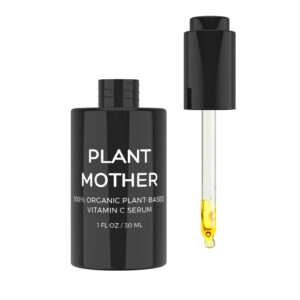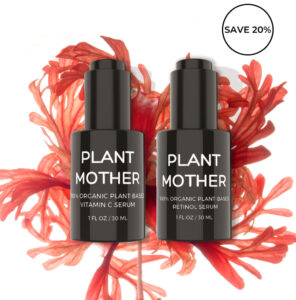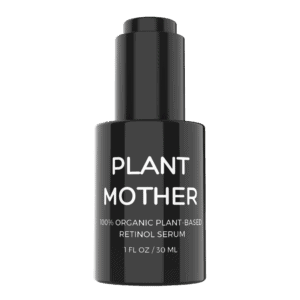What Is the Best Product for Mature Skin?

As a woman with mature skin, I want to explore the factors that make a product ideal for aging skin. From the importance of healthy, organic ingredients to the enhanced benefits of serums over conventional creams, I’ll unravel the secrets to achieving healthy and well-nourished mature skin.
For the first time, I’m noticing the crepey skin, baggy eyes, and turkey neck. They all seem to have hit lighting speed since I’ve hit my late 40s! Join me on this journey to discover the perfect skincare regimen that embraces the changes our skin goes through as we age.
CHOOSE HEALTHY ORGANIC INGREDIENTS
The best products for mature skin are made of healthy, organic, and non-irritating ingredients.
These components work synergistically to nourish and revitalize aging skin. Additionally, they help balance your hormones, which is especially important during menopause. Conventional products often contribute to hormonal disruption, instead of promoting a healthy endocrine balance.
Organic and plant-based ingredients, such as botanical oils, nourish and support the skin without causing irritation or further disrupting hormonal balance.
Focus On Facial Serums VS CREAMS
Let me tell you – serums are great for your skin! Serums provide essential nutrients and vitamins for aging skin, much more than conventional creams and moisturizers.
They go beyond traditional creams and moisturizers by delivering a concentrated dose of nutrients and vitamins crucial for maintaining the health and vibrancy of aging skin.
Use Oil-Based Products
In terms of what types of serums your skin needs, ideally oil-based serums that fight your skin’s dryness and loss of collagen that we typically experience as we age.
To combat the challenges of aging skin, natural oil-based serums are the best choice. These serums actively address issues such as dryness and the loss of collagen, providing a nourishing and moisturizing solution that specifically targets the unique needs of aging skin.
Consider incorporating serums or treatment products specifically formulated for dry and mature skin concerns, such as age spots, hyperpigmentation, or loss of moisture.
Protect your skin with Antioxidants
Include products rich in antioxidants like vitamin C and E to help combat free radicals, which contribute to premature aging. These antioxidants can help protect the skin from further aging and environmental damage.
Plant-based antioxidants are essential for mature skin as they help combat free radicals, reducing oxidative stress that accelerates aging. They also support collagen production, improving skin elasticity and reducing the appearance of fine lines and wrinkles.
Use Gentle Plant-Based Retinoids
Retinoids, such as retinol or prescription-strength tretinoin, can be beneficial for improving skin texture, promoting collagen production, and reducing the appearance of fine lines and wrinkles.
As our skin starts to age, it naturally becomes more dry and sensitive so avoid harsh, prescription-based retinols. Plant-based and organic retinol serum is a way better solution for aging skin. It doesn’t cause any redness, irritation, or sun sensitivity.
BEST Serums FOR MAture skin:
Steer clear of endocrine disruptors
Numerous conventional skincare products contain chemicals that may disrupt hormone function. These disruptors can mimic or hinder the actions of hormones like estrogen, potentially worsening hormonal imbalances.
Lower the toxic burden you put on your skin. Use organic and plant-based skincare to minimize exposure to these disruptors, reducing the risk of harmful substances and aggravating hormonal issues.
Use botanical ingredients
Plant-based skincare products frequently incorporate natural ingredients known for their gentle and soothing properties on the skin. This is particularly beneficial for women with hormonal imbalances, as their skin may be more sensitive.
look for nutrient-rich formulations
Many clean skincare products feature formulations rich in nutrients like antioxidants, vitamins, minerals, and essential fatty acids. These components support the skin’s natural barrier function, promote hydration, and provide nourishment. Well-nourished skin can contribute to overall well-being, aiding in hormonal balance, especially during and after menopause.
Professional Treatments
Consult with a licensed esthetician for professional treatments, such as hydrofacials, oxygen facials, chemical peels, or laser therapy, tailored to address specific skin concerns. These treatments can provide more intensive results when performed by a skincare professional vs at home.
Make sure to research treatments before you commit to them. For instance, RF devices are very popular but they are actually not good for mature skin because they cause loss of face fat. So, always do your homework when it comes to anti-aging treatments.
Sun Protection
Apply a broad-spectrum sunscreen with at least SPF 30 every morning, even on cloudy days. Sun protection is crucial for preventing further damage and protecting the skin from UV rays. Hyperpigmentation and melasma tend to show on mature skin due to changes in hormonal levels that happen before or during menopause. Therefore, you need to protect your skin to prevent age spots and sun spots.
When trying to maintain good and healthy skin in any age, these are some quick reminders of what products are best for mature skin. Not all mature skin is same – you know your skin best. Make sure to adjust these tips with your specific skin type.
MEDICAL DISCLAIMER
This content is for informational and educational purposes only. It is not intended to provide medical advice or to take the place of such advice or treatment from a personal physician. All readers of this content are advised to consult their doctors or qualified health professionals regarding specific health questions. The publisher of this content does not take responsibility for possible health consequences of any person or persons reading or following the information in this educational content. All viewers of this content, especially those taking prescription or over-the-counter medications, should consult their physicians before beginning any nutrition, supplement, skincare product, or lifestyle program.




